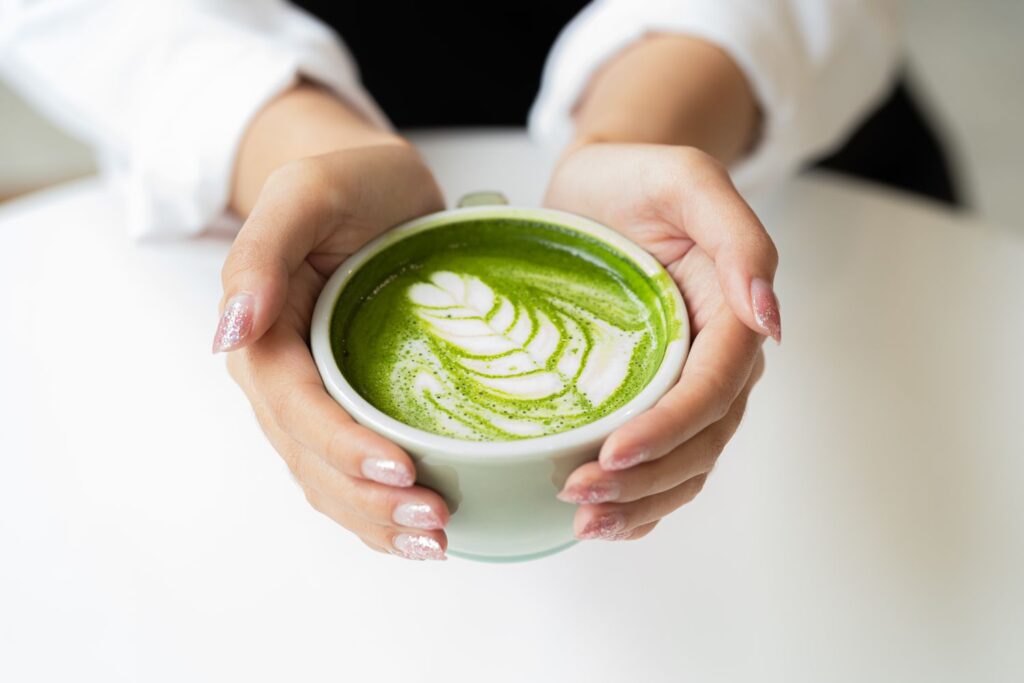Many people start the morning with coffee to boost energy and conquer the day, but switching to matcha could have an added benefit—reduced stress and anxiety.
Matcha is made from the top three layers of young tea plants called Camellia sinensis. It’s grown in the shade, allowing the plant’s leaves to develop more bio compounds (like amino acids) than other teas.
How Does Matcha Reduce Stress and Anxiety?
One study found that healthy adults who drank matcha for 15 days had significantly reduced anxiety.
Matcha may have this effect due to two compounds: L-theanine and epigallocatechin gallate (EGCG).
L-theanine is an amino acid found in green tea that has been shown to relieve stress.Because matcha is a concentrated form of green tea, it’s thought to have a more pronounced effect from L-theanine.
“It has been shown to promote relaxation without sedation by increasing alpha brain wave activity and modulating neurotransmitters like GABA, dopamine, and serotonin,” said Leigh A. Frame, PhD, executive director of the Office of Integrative Medicine and Health at George Washington University’s School of Medicine and Health Sciences.
Matcha also contains EGCG, a plant compound that may help reduce inflammation and oxidative stress, which may play a role in anxiety.
How Can Matcha Calm Stress If It Contains Caffeine?
Matcha generally has less caffeine than coffee or espresso.
Caffeine content varies, but an 8-ounce cup of brewed coffee generally contains about 96 milligrams of caffeine and 1 ounce of espresso contains about 64 milligrams.
Matcha typically has between 19 and 44 milligrams of caffeine per gram.
The body quickly absorbs caffeine, which stimulates the nervous system and can spike adrenaline and cortisol, producing a stress response for some people.
The additional compounds in matcha dull this effect.
“Matcha’s caffeine can enhance alertness and focus, but in the presence of L-theanine this stimulation tends to be smoother and less jittery compared to coffee,” Frame said. “L-theanine helps buffer this effect by promoting alpha brain wave activity, leading to smoother, more balanced stimulation, often referred to as ‘calm alertness.’”
How Much Matcha Do You Need to Drink For Its Calming Effects?
Matcha serving sizes vary, but studies show the calming dose for L-theanine is around 200 milligrams. “You’d likely need 2 to 4 grams of high-quality matcha, which is one or two servings,” said Frame.
This is the amount typically found in ceremonial-grade matcha, which is made from younger tea leaves and is therefore considered more potent.
She adds that consistent matcha drinking can help reduce stress over time, but even having a cup every so often can help.
How you prepare it matters, too. Matcha tastes great in foods like desserts, but EGCG and L-theanine can degrade at the high temperatures that typically come with long cooking times. That’s why it’s best served as a drink.
What This Means For You
Matcha is a concentrated form of green tea containing compounds with anti-anxiety properties, such as L-theanine and EGCG. Studies show that consuming matcha can significantly reduce stress and anxiety.
Matcha: A Natural Solution for Stress and Anxiety Relief
For many, the day begins with a cup of coffee, a ritual aimed at boosting energy levels. However, an alternative increasingly gaining popularity is matcha, a finely ground powder made from young tea leaves, which offers not just a delightful taste but potential benefits for mental well-being. Studies suggest that replacing coffee with matcha could lead to reduced feelings of stress and anxiety.
What is Matcha?
Matcha is derived from the top layers of the Camellia sinensis plant, the same species used for traditional green tea. The unique cultivation process involves shading the plants prior to harvesting. This process enables the leaves to develop a higher concentration of beneficial compounds, including amino acids.
Mechanisms of Stress Reduction
Research indicates that individuals consuming matcha over a period of 15 days reported significant decreases in anxiety levels. This calming effect is predominantly attributed to two key compounds found in matcha: L-theanine and epigallocatechin gallate (EGCG).
- L-theanine: This amino acid is known for its relaxing properties. It promotes a state of relaxation without sedation and is thought to increase alpha brain wave activity, which may help to regulate neurotransmitters such as GABA, dopamine, and serotonin.
- EGCG: This powerful antioxidant may contribute to reducing inflammation and oxidative stress, both of which can exacerbate anxiety.
As noted by Dr. Leigh A. Frame from the George Washington University, “It has been shown to promote relaxation without sedation by increasing alpha brain wave activity and modulating neurotransmitters.”
Understanding Caffeine in Matcha
One common concern is that matcha contains caffeine, which is often associated with increased anxiety. However, matcha typically has lower caffeine content compared to coffee. While an 8-ounce serving of brewed coffee may contain around 96 milligrams of caffeine, matcha offers between 19 and 44 milligrams per gram.
The body processes caffeine quickly, which can cause spikes in adrenaline and cortisol, particularly in caffeine-sensitive individuals. Yet, the presence of L-theanine in matcha can mitigate these effects. Dr. Frame suggests, “Matcha’s caffeine can enhance alertness and focus, but in the presence of L-theanine this stimulation tends to be smoother and less jittery compared to coffee.”
Optimal Consumption for Calming Benefits
The amount of matcha required to experience its calming effects varies, but studies suggest that around 200 milligrams of L-theanine is effective. To achieve this, consuming 2 to 4 grams of high-quality matcha—which is commonly found in ceremonial-grade preparations—is recommended.
Furthermore, while drinking matcha sporadically may still offer benefits, regular consumption can significantly influence stress levels over time. How matcha is prepared also matters; for optimal retention of its health-promoting compounds, it is advised to consume it as a beverage rather than in hot dishes, as prolonged exposure to high temperatures can degrade L-theanine and EGCG.
What This Means For You
Incorporating matcha into your daily routine may provide stress relief due to its high levels of sleep-inducing and anxiety-reducing compounds like L-theanine and EGCG.
